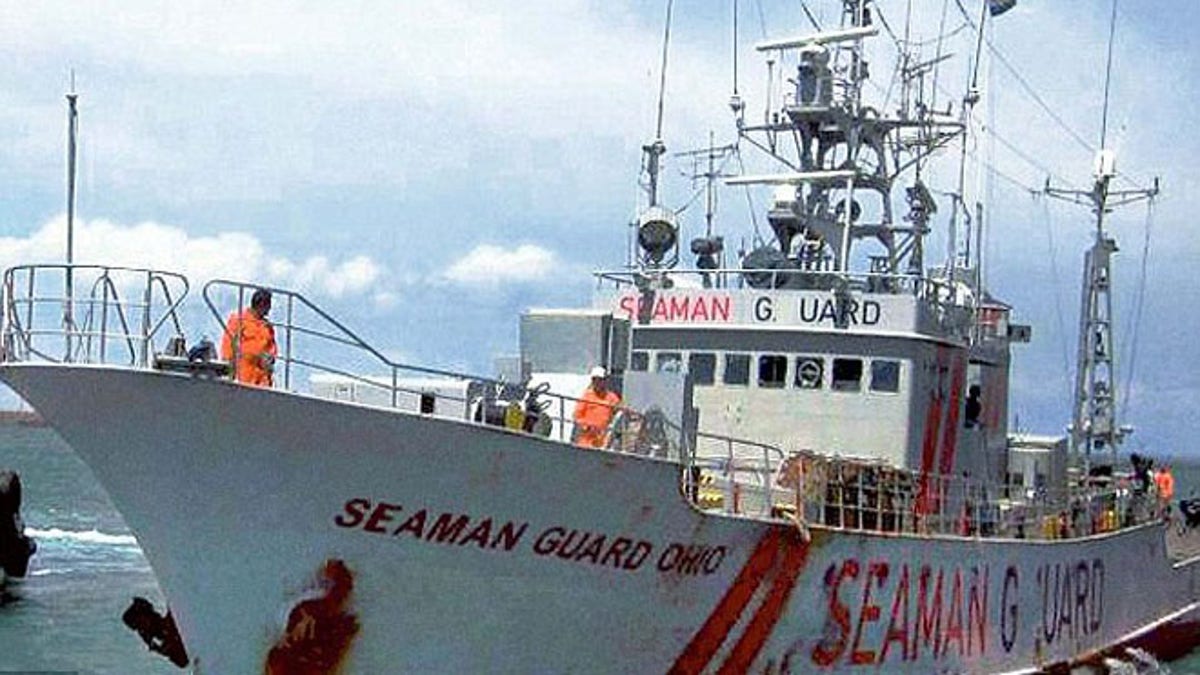
This undated image, provided by AdvanFort, shows the MV Seaman Guard Ohio, a U.S. anti-piracy ship that patrols the waters in high-risk areas.
The plight of a crew from an American ship that protects merchant vessels from piracy has become more desperate, with a report that the chief engineer tried to kill himself after Indian authorities raided the ship and threw everyone aboard in jail on dubious charges.
Police in a southern Indian port city arrested the crew of a U.S.-owned ship, known as the MV Seaman Guard Ohio, on Oct. 12 for entering Indian waters with a large cache of weapons and ammunition on board.
[pullquote]
William Watson, president of the Virginia-based security firm AdvanFort -- which owns the ship -- claims that all arms and ammunition on board are licensed and were necessary to support their anti-piracy mission in the Indian Ocean.
"All of the firearms and ammunition are used to safeguard commercial ships from piracy in high-risk areas," Watson told FoxNews.com Monday. "These guys are decorated military veterans. They're brave, honest men who spend months away from their families to protect ships from pirates and this is how they’re being treated."
Watson said the security vessel was detained Oct. 12 by the Indian Coast Guard and is currently anchored at a port in southern Tamil Nadu state -- unmanned with its engine still running.
The ship was running low on fuel in international waters and had asked the Indian government if it could come into port for refueling -- a request that was denied, according to Watson.
"By the time the Indians said 'no,' we were getting dangerously low on fuel, so we went to an agent and broker in India to buy a small amount of fuel to get us to another, smaller port in either Sri Lanka or the Maldives," Watson said.
After pumping about 423 gallons (1,600 liters) into the vessel -- an amount Watson said is "nothing in terms of maritime fuel" -- the Indian coast guard directed the ship to come into port.
Indian authorities then "poured onto our ship," Watson said, claiming the documents, permits and licenses for the firearms and ammunition were invalid. They arrested and jailed 33 of the crew members, which included Indian, British and Estonian nationals, and then came back two days later to apprehend the ship's engineer and captain -- both Ukrainian nationals.
The chief engineer, whom Watson declined to name, attempted suicide as the Indian authorities forced him from the vessel, according to multiple sources. Capt. Dudnik Valentyn, who had spent nearly a year as a captive of Somali pirates in 2011, was also taken and thrown into an Indian jail.
"We believe that all of our documents, permits and licenses are valid and in order," Watson told FoxNews.com, adding that he and his attorneys are in contact with the U.S. State Department as well as diplomats in the Ukraine, India, England and Estonia.
"I can only imagine what an Indian jail is like," he said. "We want to make sure that this is resolved and resolved quickly and that these guys get to go home to their families."
The ship's captain told investigators that the company provides armed escorts to merchant vessels traveling in pirate-infested waters in the Indian Ocean. AdvanFort said the vessel was used primarily as an accommodation platform for its guards between duties on commercial ships as they traveled through dangerous areas.
According to Advanfort, the men were equipped with uniforms, protective equipment, medical kits and rifles and ammunition to help them provide counter-piracy protection. Police seized 35 automatic weapons and nearly 5,700 rounds of ammunition from the security guards on the ship, police said.
Advanfort has been at the forefront of the battle to stop piracy, and pushed to prove the legality of using private security companies to protect shipping. The seas from the east coast of Africa to India and beyond have become increasingly congested with vessels involved in fighting who target ships moving along this important trade route.
Warships from several countries, including the U.S., China, India, Italy and the United Kingdom are involved in the anti-piracy operation. Analysts say anti-piracy measures -- such as using private security firms -- are currently poorly regulated.
India has been a strong supporter of multinational efforts to stop the pirates, who mostly come from Somalia, but it has also become increasingly sensitive to any intrusions in its maritime borders.
This came after two Italian marines on an anti-piracy operation allegedly shot two fishermen inside Indian waters last year.
FoxNews.com's Cristina Corbin and the Associated Press contributed to this report.
